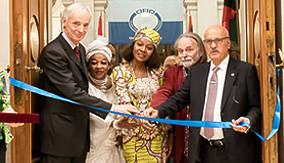We use Cookies. Read our Terms
- News & Events
- Press releases
- 2017
- OFID celebrates 41st Anniversary with Susanne Wenger exhibition
OFID celebrates 41st Anniversary with Susanne Wenger exhibition

From left: Dr Werner Druml, former Ambassador to Nigeria; Honorable Lola Ayorinde; Ms Sarah Yusuf, Nigerian Embassy in Austria; Professor Wolfgang Denk, Susanne Wenger Foundation; OFID DG Al-Herbish.
Vienna, Austria, January 27, 2017. OFID (The OPEC Fund for International Development) is this year celebrating the 41st Anniversary of its establishment with an exhibition of the works of Austrian artist and Yoruba priestess Susanne Wenger.
Titled ‘Susanne Wenger on a Sacred River in Nigeria,’ the exhibition was put together in partnership with the Nigerian Embassy in Vienna and the Susanne Wenger Foundation.
The exhibit was opened by OFID Director-General Mr. Suleiman J Al-Herbish and HE Dr Werner Druml, a leading supporter of the Foundation.
Said Al-Herbish: “It is a great honor for OFID to bring together its Member Country Nigeria and host country Austria in this unique way.”
In his welcome remarks, Al-Herbish commended Nigeria for its contribution to sustainable development and, in particular, its role as host of OFID’s 2008 workshop on energy poverty. Held in Abuja, this ground-breaking gathering was one of the first steps taken by OFID in response to the directive of the November 2007 Third OPEC Summit, which called upon OFID to sharpen its focus on energy poverty eradication. In this context, the Director-General outlined OFID’s pioneering efforts towards providing conventional and renewable energy to poor communities.
Wenger is famous for the work she carried out after moving to Nigeria in 1950, where she immersed herself in the Yoruba culture and dedicated her efforts to the restoration of the derelict shrines of the Yoruba religion.
Through her art, which can be found along the Oshun River at the edge of the town of Oshogbo, Wenger almost single-handedly protected from destruction one of the most important spiritual centers of Yoruba culture together with the last of the giant rainforest trees in the area. In 2005, the Sacred Groves of Oshogbo, Susanne Wenger’s main architectural and sculptural work, was registered as a UNESCO World Heritage Site.
Speaking at the opening of the exhibition, HE Druml, a former ambassador to Nigeria, said: “Susanne Wenger, seen from any imaginable angle, was an outstanding personality. Molded by Europe and a disciple of modern European Art, she became firmly rooted in Nigeria. She remained a fascinating person between two worlds.”
In 1995, Wenger herself initiated the Susanne Wenger Foundation, which has the responsibility of safeguarding her graphic works, paintings and batiks, and oversaw the creation of the Susanne Wenger Archives in Krems, Lower Austria.
The Foundation’s Professor Wolfgang Denk, who was also present at the opening reception, paid tribute to Wenger as the guardian of Yoruba traditions and religion. “It is thanks to her work that the Sacred Oshun Oshogbo Grove was saved,” he said.
The Wenger event is the latest in a long line of exhibits hosted by OFID to showcase the cultures of its Member and Partner Countries. It follows a break in this tradition in 2016, the year of OFID’s 40th Anniversary, which was dedicated to highlighting the plight of refugees. Among a series of events and activities organized to promote this theme was the exhibit “Equal Dreams,” which highlighted the specific challenges facing refugee children.